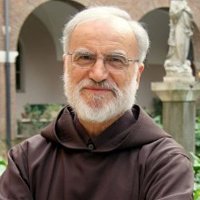Youtube (featured videos)
Good news
- Raniero Cantalamessa
 he Baptism in the Spirit's effectiveness in reactivating baptism consists in this: finally man contributes his part -- namely, he makes a choice of faith, prepared in repentance, that allows the that allows the work of God to set itself free and to emanate all its strength. It is as if the plug is pulled and the light is switched on. The gift of God is finally "untied" and the Spirit is allowed to flow like a ftragrance in the Christian life.
he Baptism in the Spirit's effectiveness in reactivating baptism consists in this: finally man contributes his part -- namely, he makes a choice of faith, prepared in repentance, that allows the that allows the work of God to set itself free and to emanate all its strength. It is as if the plug is pulled and the light is switched on. The gift of God is finally "untied" and the Spirit is allowed to flow like a ftragrance in the Christian life. - Peter Hocken
 During the night between Friday and Saturday, in the early morning hours of 10 June 2017, the Lord called back to Him a great man, Father Peter Hocken.
He died at the age of almost 85. He was a servant of God, a friend, a priest who loyally served the Body of Christ until his last breath, all the world round. The Lord gave him an extraordinary intellect and wisdom, together with the experience of baptism in the Holy Spirit. He also received from God the talent and ability to provide specific and comprehensible theological explanations and descriptions of spiritual experiences that are taking place within the Church, notably after the Second Vatican Council.
During the night between Friday and Saturday, in the early morning hours of 10 June 2017, the Lord called back to Him a great man, Father Peter Hocken.
He died at the age of almost 85. He was a servant of God, a friend, a priest who loyally served the Body of Christ until his last breath, all the world round. The Lord gave him an extraordinary intellect and wisdom, together with the experience of baptism in the Holy Spirit. He also received from God the talent and ability to provide specific and comprehensible theological explanations and descriptions of spiritual experiences that are taking place within the Church, notably after the Second Vatican Council. - Dr. Martin Luther King Jr.
 "I have a dream," he began, "that one day on the red hills of Georgia, sons of former slaves and sons of former slave-owners will be able to sit down together at the table of brotherhood. "I have a dream my four little children will one day live in a nation where they will not be judged by the color of their skin but by the content of their character."
"I have a dream," he began, "that one day on the red hills of Georgia, sons of former slaves and sons of former slave-owners will be able to sit down together at the table of brotherhood. "I have a dream my four little children will one day live in a nation where they will not be judged by the color of their skin but by the content of their character." - Peter Dufka SJ
 We all know, based on our personal experience, that the cooperation with most intelligent people is not often easy. These people usually do not establish friendship easily. It is interesting also that university graduates with an honour degree usually do not fit in to the working environment in the best way and that their high intellect is of a little help in overcoming personal or marriage crises.
We all know, based on our personal experience, that the cooperation with most intelligent people is not often easy. These people usually do not establish friendship easily. It is interesting also that university graduates with an honour degree usually do not fit in to the working environment in the best way and that their high intellect is of a little help in overcoming personal or marriage crises. - Marek Nikolov
 The aim of the “Jesus Heals” prayer gatherings is experiencing the fact that God is Love. He is Love that wants to give itself to other people. God wants to show us His mercy even through healing, signs, wonders, and miracles.
The aim of the “Jesus Heals” prayer gatherings is experiencing the fact that God is Love. He is Love that wants to give itself to other people. God wants to show us His mercy even through healing, signs, wonders, and miracles.
Video
Prorocká výzva Geoffa Poultera pre Slovensko, ktorá sa začína napĺňať.
 Zaujímavá a výpovedná skúsenosť západoeurópskeho muža s hinduizmom, budhizmom, jógou, ezoterikou a okultizmom.
Zaujímavá a výpovedná skúsenosť západoeurópskeho muža s hinduizmom, budhizmom, jógou, ezoterikou a okultizmom.
 Príbeh bývalého teroristu, ktorý dnes spája etniká a kmene.
Príbeh bývalého teroristu, ktorý dnes spája etniká a kmene.
Stephen Lungu
 Hudobníčka Lacey Sturm, bývalá speváčka kapely Flyleaf, bola presvedčenou ateistkou a mala v úmysle vziať si život... ale zrazu sa všetko zmenilo.
Hudobníčka Lacey Sturm, bývalá speváčka kapely Flyleaf, bola presvedčenou ateistkou a mala v úmysle vziať si život... ale zrazu sa všetko zmenilo.
We all are part of a great story. The great story of the world is composed of past and present stories of lives of individual people. The portal mojpribeh.sk is focused on the most important moment of the story of the world and individual, the moment of personal experience of person with God.
Message - Raniero Cantalamessa
Baptism in the Holy Spirit

O.F.M. Cap. (born July 22, 1934) is an Italian Catholic priest in the Order of Friars Minor Capuchin and theologian. He has served as the Preacher to the Papal Household since 1980, under Pope John Paul II, Pope Benedict XVI and Pope Francis. Zdroj slova z informačného buletinu (ICCRS).
SUMMARY: The Baptism in the Spirit is not a sacrament, but it is related to several sacraments. The Baptism in the Spirit makes real and in a way renews Christian initiation. At the beginning of the Church, Baptism was administered to adults who converted from paganism and who, made on the occasion of Baptism, an act of faith and a free and mature choice. Today it is substituted instead by intermediary parents or godparents. In this situation, rarely, or never, does the baptized person ever reach the stage of proclaiming in the Holy Spirit "Jesus is Lord". And until one reaches this point, everything else in the Christian life remains out of focus and immature. Miracles no longer happen and we experience what Jesus did in Nazareth: "Jesus could not perform many miracles because of their lack of faith" (Mt.13.58). The Baptism in the Spirit's effectiveness in reactivating baptism consists in this: finally man contributes his part -- namely, he makes a choice of faith, prepared in repentance, that allows the that allows the work of God to set itself free and to emanate all its strength. It is as if the plug is pulled and the light is switched on. The gift of God is finally "untied" and the Spirit is allowed to flow like a ftragrance in the Christian life.
Before talking about the Baptism in the Spirit, it is important to try and understand what the Renewal in the Spirit is all about. After the Second Vatican Council, many things in the Church's life were renewed - the liturgy, pastoral care, canon law, the constitutions of the religious orders and their dress. Although all these things are important, they are only external things and woe to us if we stop there and think the task is finished, because it is not structures but souls that are important to God. "It is in men's souls that the Church is beautiful," writes St. Ambrose, and therefore it is in men's souls that she must make herself beautiful.
God Is Author and Power
The Renewal is a renewal in which God, not man, is the principle author. "I, not you," says God, "make all things new" (Rev 21:5); "My Spirit -- and He alone -- may renew the face of the earth" (see Psalm 104:30). From the religious point of view, we tend to view things from a ptolemaic perspective: at the foundation there are our efforts -- organization, efficiency, reforms, goodwill -- with the earth here as the center which God comes to strengthen and crown, by His grace and our effort.
We must -- at this point the Word of God cries out -- "give the power back to God" (Psalm 68:35) because "the power belongs to God" (Psalm 62:12). For too long we have usurped this power of His from God, by managing it as if it were ours, as if it was up to us to govern the power of God. We have to totally change our perspective. That is, to acknowledge simply that without the Holy Spirit, we cannot do anything, not even say, "Jesus is Lord!" (I Cor 12:3).
Baptism in the Spirit and the Sacrament of Baptism
The Baptism in the Spirit is not a sacrament, but it is related to a sacrament, to several sacraments in fact -- to the sacraments of Christian initiation. The Baptism in the Spirit makes real and in a way renews Christian initiation. The primary relationship is with the Sacrament of Baptism. In fact, this experience is called the Baptism in the Spirit by English-speaking people.
We believe that the Baptism in the Spirit makes real and revitalizes our baptism. To understand how a sacrament which was received so many years ago, usually immediately after our birth, could suddenly come back to life and emanate so much energy, as often happens through the Baptism in the Spirit, it is important to look at our understanding of sacramental theology.
Catholic theology recognizes the concept of a valid but "tied" sacrament. A sacrament is called tied if the fruit that should accompany it remains bound because of certain blocks that prevent its effectiveness. An extreme example of this is the Sacrament of Matrimony or Holy Orders received in the state of mortal sin. In such circumstances these sacraments cannot grant any grace to people until the obstacle of sin is removed through penance. Once this happens the sacrament is said to live again thanks to the indelible character and irrevocability of the gift of God: God remains faithful even if we are unfaithful because He cannot deny Himself (see Timothy 2:13).
In the case of baptism what is it that causes the fruit of the sacrament to stay tied? The sacraments are not magical rituals that act mechanically, without the person's knowledge or disregarding any response on his part. Their effectiveness is the fruit of a synergy or cooperation between divine omnipotence -- in reality the grace of Christ or the Holy Spirit -- and human freedom, because as St. Augustine said, "The one who created you without your cooperation, will not save without your cooperation."
The opus operatum of baptism, namely, God's part or grace, has several aspects -- forgiveness of sins, the gift of the theological virtues of faith, hope, and charity (these, however, only as a seed), and divine sonship -- all of which are operated through the effective action of the Holy Spirit. But what does the opus operantis in baptism -- namely, man's part, consist of? It consists of faith! Whoever believes and is baptized shall be saved (Mark 16:16). At the side of baptism, therefore, there is another element: the faith of man. "To all who received Him He gave the power to become children of God: to those who believe in His name" (John 1:13).
Baptism is like a divine seal put on the faith of man: having heard the word of truth, the gospel of your salvation and having believed in it, you have received (of course, in baptism) the seal of the Holy Spirit (see Ephesians 1:13)
Baptism and Confirmation of Faith
At the beginning of the Church, Baptism was such a powerful event and so rich in grace that there was no need normally of a new effusion of the Spirit like we have today. Baptism was ministered to adults who converted from paganism and who, properly instructed, were in the position to make, on the occasion of baptism, an act of faith and a free and mature choice. It is sufficient to read the mistagogic catechesis on baptism attributed to Cyril of Jerusalem to become aware of the depth of faith to which those waiting for baptism were led. In substance, they arrived at baptism through a true and real conversion, and thus for them baptism was a real washing, a personal renewal, and a rebirth in the Holy Spirit.
The favorable circumstances that allowed baptism, at the origins of the Church, to operate with so much power was that the grace of God and man's response met at the same time, and there was a perfect synchronization
Infant Baptism in Non-Christian Environments
But now this synchronization has been broken, as we are baptized as infants, and little by little this aspect of the free and personal act of faith no longer happens. It was substituted instead by a decision by intermediary parents or godparents. When a child grew up in a totally Christian environment, this faith still could flourish, even though at a slower rate. Now, however, this is no longer the case and our spiritual environment is even worse than the one at the time of the Middle Ages. Not that there is no normal Christian life, but this is now the exception rather than the rule.
In this situation, rarely, or never, does the baptized person ever reach the stage of proclaiming in the Holy Spirit, "Jesus is Lord." And until one reaches this point, everything else in the Christian life remains out of focus and immature. Miracles no longer happen, and we experience what Jesus did in Nazareth: "Jesus could not perform many miracles because of their lack of faith." (Mt 13. 58)
God's Will
Here, then, is what I feel is the significance of the Baptism in the Spirit. It is God's answer to this malfunctioning that has grown up in the Christian life in the Sacrament of Baptism.
It is an accepted fact that over the last few years there has been some concern on the part of the Church, among the bishops, that the Christian sacraments, especially baptism, are being administered to people who will not make any use of them in life. As a result, it has even been suggested that baptism should not be administered unless there are some minimum guarantees that it will be cultivated and valued by the child in question. For one should not throw pearls to dogs, as Jesus said, and baptism is a pearl, because it is the fruit of the blood of Christ.
But it seems that God was concerned about this situation even before the Church was, and raised up here and there in the Church movements aimed at renewing Christian initiation in adults. The Charismatic Renewal is one of these movements and in it the principle grace is, without doubt, linked to the Baptism of the Spirit and to what comes before it.
Release and Confirmation of Faith
It's effectiveness in reactivating baptism consists in this: finally man contributes his part -- namely, he makes a choice of faith, prepared in repentance that allows the work of God to set itself free and to emanate all its strength. It is as if the plug is pulled and the light is switched on. The gift of God is finally "untied" and the Spirit is allowed to flow like a fragrance in the Christian life.
In addition to the renewal of the grace of baptism, the Baptism in the Spirit is also a confirmation of one's own baptism, a deliberate "yes" to it, to its fruit and its commitments, and as such it is also similar to Confirmation too. Confirmation being the sacrament that develops, confirms, and brings to completion the work of baptism. From it, too, comes that desire for greater involvement in the apostolic and missionary dimension of the Church that is usually noted in those who receive the Baptism in the Spirit. They feel more inclined to cooperate with the building up of the Church, to put themselves at her service in various ministries both clerical and lay, to witness for Christ -- to do all those things that recall the happening of Pentecost and which are actuated in the Sacrament of Confirmation.
The Baptism of the Spirit is not the only occasion known within the Church for this reviving of the sacraments of initiation. There is, for example, the renewal of the baptismal promises in the Easter vigil, and there are the spiritual exercises, and the religious professions, sometimes called a "second baptism." and at the sacrament level there is Confirmation.
It is also not difficult to discover in the lives of the saints, the presence of a spontaneous effusion, especially on the occasion of their conversion. The difference with the Baptism in the Spirit, however, is that it is open to all the people of God, small and great, and not only to those privileged ones who do the Ignatian Spiritual Exercises or make a religious profession.
The Will of God in History
Where does this extraordinary force that we experienced when we were Baptized in the Spirit come from? What we are talking about is not just some theory, but something that we ourselves have experienced and therefore can say with John, "What we have heard, what we have seen with our own eyes, what our hands have touched, this we also announce to you, so that you too be in communion with us." (see l John 1:1-11). The explanation of this force is in the will of God -- because God was pleased to renew the Church today by this means -- and this is enough.
There are certainly some biblical precedents, like the one told in Acts 8:14-17, when Peter and John, having heard that Samaria welcomed the Word of God, went there, prayed for them, and laid hands on them so that they could receive the Holy Spirit. But these biblical precedents, are not sufficient to explain the vastness and depth of the contemporary manifestation of the effusion of the Spirit.
The explanation therefore is in God's plan. We could say, by paraphrasing a famous saying of the Apostle Paul: Because Christians, with all their organization, were not able to transmit the power of the Spirit, God was pleased to renew the believers through the foolishness of the Baptism in the Spirit. In fact theologians look for an explanation and responsible people for moderation, but simple souls touch with their hands the power of Christ in the Baptism of the Spirit (1 Cor 12:1-24).
We men, and in particular we men of the Church, tend to limit God in His freedom: we tend to insist that He follows a compulsory pattern (the so called channels of grace) and we forget that God is a torrent that breaks loose and creates its own path and that the Spirit blows where and how he wants (notwithstanding the role of the teaching of the Church to discern what actually comes from the Spirit and what does not come from Him). What does the Baptism of the Spirit consist of and how does it work? In the Baptism of the Spirit there is a secret, mysterious move of God that is His way of becoming present, in a way that is different for each one because only He knows us in our inner part and how to act upon our unique personality. There is also the external community part which is the same for everyone and consists mainly of three things: brotherly love, laying on of hands, and prayer. These are non-sacramental but simply ecclesiastic elements.
Holy Spirit Proceeding from the
Father and the Son Where does the grace we experience in the Baptism of the Spirit come from? From those around us? No! From the person who receives it? No! It comes from God! We can only say that such grace is related to baptism, because God acts always with coherence and faithfulness and He does not do and undo. He honors the commitments and institutions of Christ. One thing is certain -- that it is not the brothers who impart the Holy Spirit, but they do invoke the Holy Spirit on the person. The Spirit cannot be given by any man, not even the Pope or a bishop, because no man possesses by himself the Holy Spirit. Only Jesus may give the Holy Spirit; all the others do not possess the Holy Spirit, but rather are possessed by Him. As to the manner of this grace, we may speak of a new coming of the Holy Spirit, of a new mission by the Father through Jesus Christ, or a new anointing corresponding to a new degree of grace.
Fr. Cantalamessa has been the Papal preacher to Pope John Paul II's Pontifical household since 1980. Originally from the (ICCRS) newsletter, this article is apparently based on a talk given to a gathering of religious men.
Latest
- Rhett Vorster
Personal experience with Christ - Paul Holliday
Seeking answers to the afterlife - Harriet Coombe
Something better than healing - Denis Chane Sing Guan
Hearts home - Milan Tószegi
I did not see it yet, but I believed in His Word.
Random
- Mons. Jozef Tóth
- Veronika Barátová
God is love - Pavol Danko
I am a gift - Sid Roth
Its supernatural - Goran Čurkovič
Total: 162 stories in this language.
There are 516 in all languages. To change the language please click on one of the flags.
Talks
- Geoff a Gina Poulter
 Geoff and Gina Poulter are active in healing ministry in Great Britain and in other European countries. They have zeal for building Lords kingdom. In Slovakia are already known mainly throwgh Jesus heals ministry where they were main speakers. They believe, that Lord comes with power, when we call him by His name and walk in faith. They are full of gentleness and kind behavior to people, which they serve with prayer for healing and prophetic giftings. Their ministry folows healings, sings and wonders.
Geoff and Gina Poulter are active in healing ministry in Great Britain and in other European countries. They have zeal for building Lords kingdom. In Slovakia are already known mainly throwgh Jesus heals ministry where they were main speakers. They believe, that Lord comes with power, when we call him by His name and walk in faith. They are full of gentleness and kind behavior to people, which they serve with prayer for healing and prophetic giftings. Their ministry folows healings, sings and wonders. - Petr Jašek
 As we know, faith is not a question of heritage. People must get their personal relation with the Lord Jesus Christ. This cannot be inherited. You have to be reborn in Jesus. In my life something similar happened.
As we know, faith is not a question of heritage. People must get their personal relation with the Lord Jesus Christ. This cannot be inherited. You have to be reborn in Jesus. In my life something similar happened. - Ján Volko
 I think Jesus plays a very important role. Faith in God helps me in difficult moments and also during competitions. I feel that God gives me His graces and blessing – and this is a huge support for me.
I think Jesus plays a very important role. Faith in God helps me in difficult moments and also during competitions. I feel that God gives me His graces and blessing – and this is a huge support for me.

